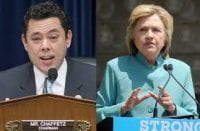BY JAKE MCGUIRK – STAFF WRITER
As if the country had not had a big enough dose of reality television from the meteoric ascendance of Donald Trump, the FBI further fueled Hillary Clinton’s email “scandal” days before the election. Yet the news did not reach the public directly from Director James Comey, but rather via the Twitter account of Utah Congressman Jason Chaffetz. He tweeted that the case was “reopened” after an unrelated investigation into Anthony Weiner yielded previously unknown emails to and from Clinton. Chaffetz, by the way, is the same Congressman who withdrew his endorsement of Trump after the infamous “grab her by the pussy” tape came out, and then completely flip-flopped and declared he was voting for Trump after all.
The fact of the matter is that the investigation was not “reopened” because it was never actually closed, as Comey previously indicated. FBI staffers were kept on the case after its supposed conclusion, which is apparently standard with these types of investigations. Had the investigation been formally closed, its reopening would have been far more newsworthy. In reality, the FBI was doing its job and making sure that some likely unrelated emails were screened as part of the investigation. But because the news came not from Director Comey, and instead from a biased Congressman and subsequently disseminated by sensationalist media outlets, it seemed as if Clinton was once again under serious threat of legal action.
The Clinton campaign was outraged. Clinton’s campaign manager, John Podesta, said, “Director Comey’s letter refers to emails that have come to light in an unrelated case, but we have no idea what those emails are and the Director himself notes they may not even be significant. It is extraordinary that we would see something like this just eleven days out from a presidential election.”
The same day this news hit the airwaves, more information trickled slowly out of the FBI through unofficial sources. Apparently the new emails were not sent by Clinton, nor were they related to any of the WikiLeaks emails hacked from Podesta’s email account, nor were they withheld from the FBI previously. Given all of that, it seems like this should have been a minor story, if a story at all. But the damage was done, and Clinton’s opponents and allies were swept up in a frenzy of rhetoric and accusation. Few, including the Clinton campaign (understandably), remained coolheaded. The news’s quantitative effect on the election is debatable, but it certainly mattered.
This episode in the email saga especially picks out a problem in America. We seem to eagerly await the next scandal or shocking headline, whilst important news is an afterthought, or an unwanted commercial break that interrupts the soap opera that the political news cycle has become. Of course scandals do exist, and the public ought to know when its elected officials have been dishonest or severely offensive. But it is one thing to be informed and another to be exploited. And that is just what news media does to its viewers. They exploit our fear and obsession with dirty politicians and conspiracies, and inundate us with superfluous detail and misleading speculation.
That the Clinton email debacle was a headline almost constantly for months on end is indicative of a press and citizenry that have lost their way. An honest presentation of the news does not require endless repetition and hours of commentary. The coverage of JFK’s assassination was not nearly as frantic and loud as any given day of this presidential campaign.
It important that we hold our news media accountable. They are our best insight into the inner workings of government. Investigative journalism will be more important now than ever before since our president-elect has already refused the media access to many of his events, as well as going so far as to prohibit his future chief strategist, Steve Bannon (a white supremacist and propagandist), from interviewing with any reporters.
Although print news is a dying medium, it may be worth reconsidering our switch to broadcasted news. Print media is not innocent of sensationalism either, but there are more newspapers than TV stations, and the more options for news we have, the easier it is to spot falsehood and deceit. To allow CNN, Fox, and NBC a monopoly on information would be dangerous. They are corporations, concerned with ratings and profit and advertising. News channels used to compete for viewers by aspiring to be the most reliable and trusted station. Now, they try to be the most exciting station, appealing to a country with a much shorter attention span than it had fifty years ago.
Whether you reside on the right or left of the aisle, you should desire the truth. Turn off the TV, ask for some cheap student subscriptions to newspapers, and do not settle for the most immediately available source of news. It is vital to our democracy that we demand information – not the information that would excite us the most, but the information that is true.
